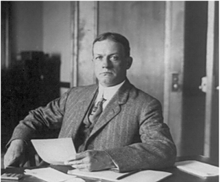Earl Rogers
| Earl Rogers | |
|---|---|

Earl Rogers, about 1911
|
|
| Born |
November 18, 1869 Buffalo, New York |
| Died | February 22, 1922 (aged 52) Los Angeles, California |
| Occupation | Lawyer |
Earl Rogers (November 18, 1869 – February 22, 1922) was an American trial lawyer.
Earl Rogers was the son of a Methodist minister. When he was still a small boy, his father went to California.
Rogers was admitted to the bar in 1897. One of his clerks was Buron Fitts.
Rogers appeared for the defense in 77 murder trials and lost only three. He astonished medical experts on the witness stand with his technical questions. His expertise was so complete that he became a professor of medical jurisprudence and insanity in the College of Physicians and Surgeons as well as a professor at the University of Southern California Law School. In "The Case of the Grinning Skull," Rogers introduced the skull of a victim to prove that what appeared to be a fracture resulting from a violent blow from a blunt instrument was, in fact, the result of carelessness by the autopsy surgeon. His client walked free.
Ten years after his death, impressed with accounts of Rogers’ cases, attorney and author Erle Stanley Gardner reincarnated Rogers as the character Perry Mason. Earl Rogers's life is recounted by his daughter Adela Rogers St. Johns, who was his sidekick for most of his legal career, in her book Final Verdict (Doubleday, 1962), which was the basis of the tv film "Final Verdict", that was produced by Warner Bros.
Rogers defended William Alford from a murder charge by demanding that the victim's intestines be brought into the courtroom, where he had an expert witness testify that the path of the bullet confirmed Alford's story.
Rogers defended Charles F. Mootry from a charge of murdering his wife by appealing to the jurors' own feelings about their wives. After the trial, when Mootry tried to congratulate Rogers, he turned away from Mootry and said, "Get away from me you slimy pimp, you're as guilty as hell and you know it."
Rogers is also remembered for the defense in the Catalina Island murder case. In the early morning hours of August 13, 1902 at the Metropole Hotel, a colorful gambler and cardshark named William A. Yeagar, known as "the Louisville Sport", was murdered during a cardgame. Alfred Boyd was one of three men in a room playing poker. Upon hearing the sound of gunshots, a bartender entered the room, and saw two men and the dead body of the third, bleeding over the Ace of Spades. Harry Johnson, the third man at the table, ran from the room yelling "He shot him, he shot him!" and handed Boyd's gun to the bartender. The first man on the scene and almost-witness bartender Jim Davin thought there was no question that Boyd was the killer. Boyd was charged with the murder, and Rogers won his acquittal after getting Johnson effectively to confess under masterful cross-examination.
...
Wikipedia
